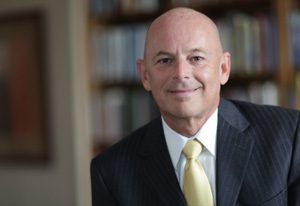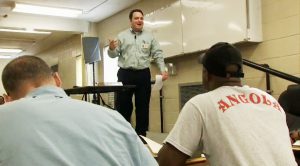WASHINGTON (BP)—Incarcerated individuals became more forgiving, accountable, grateful and capable of self-control after taking an eight-week Bible study on the Gospel of Mark, a newly released study from Prison Fellowship International and Baylor University found.
The course, “The Prisoner’s Journey,” also helped decrease depression, anxiety and anger among those enrolled, thereby reducing drug abuse and fighting, according to initial findings of the first phase of the study conducted in prisons in South Africa and Colombia.

Byron Johnson, founding director of Baylor’s Institute for Studies of Religion, said the research shows the importance of faith-based prison reform.
“Programs like (The Prisoner’s Journey) yield empirical validation of the reality that much of the truly innovative work being done in the name of prison reform is coming from faith-based programs operated by organizations like Prison Fellowship International,” Johnson said.
“These remarkable programs—led by faith-motivated volunteers—are doing a lot to transform individuals and prisons across the world. I hate to think where we would be without these ministries that are dedicated to serving the least of these.”

Southern Baptist seminaries have offered Bible-based degrees to prison populations, beginning 20 years ago with the New Orleans Baptist Theological Seminary’s flagship program at Louisiana State Penitentiary at Angola. Graduates become ministers among their fellow inmates.
Jody Dean, senior regional associate dean for New Orleans Seminary extension centers, said such programs are part of the seminary’s mission.
“As you unpack our mission statement, the prison programs fit clearly in line with our mission of those that are called to walk with Christ to help them be prepared to proclaim his truth and fulfill his mission,” Dean has said. “And we see them doing that by beginning to teach the word (of God), share the truth and share Christ with those around them.”
Baylor University and Prison Fellowship International released initial findings Oct. 20 after conducting the 40-month study that ended in April, revealing varying degrees of change among prison populations based on such variables as their relationship with God before they enrolled in the Bible study, and whether they were motivated by a sincere desire to change or a selfish desire to possibly earn early release from prison.
Sign up for our weekly edition and get all our headlines in your inbox on Thursdays

In Colombia, researchers compared 217 prisoners engaged in the Bible study with the outcomes of 217 prisoners not enrolled in the Bible study.
“In Colombia, we found inmates who completed the Bible study increased their religious involvement,” researchers said, with participants ranking near a negative 0.10 before the Bible study, and rising to a positive 0.60 after the Bible study on the researchers’ religiosity scale, but researchers did not cite specific numerical results. “On the other hand, there was no significant change among those who did not participate in the program (control group).”
Among the 437 inmates who took the Bible study in South Africa, compared to a control group of 125, researchers said their findings “confirmed the importance of religious involvement in relation to inmate transformation through the development of prosocial changes in self-identity and moral character.
 Specifically, increased religiosity contributed to an inmate’s cognitive and emotional identity transformations as well as the virtues of forgiveness, empathy, and self-control, which in turn reduced inmate’s negative emotional states.
Specifically, increased religiosity contributed to an inmate’s cognitive and emotional identity transformations as well as the virtues of forgiveness, empathy, and self-control, which in turn reduced inmate’s negative emotional states.
In addition, involvement in The Prisoner’s Journey course decreased the risk of prison misconduct both directly and indirectly by fostering gratitude among participating inmates.”
Researchers did not reveal numerical findings among the South African participants, but researchers hope to expand the study to include additional prison populations.
More than 460,000 incarcerated people have taken the course Prison Fellowship International conducts in prisons in 39 countries including Latin America, the Asia Pacific region, the Caribbean, Europe and the Middle East.
Prison Fellowship International promotes itself as having worked since 1979 to transform prison populations with the power of the gospel, hoping to engage 20 percent of the global prison population with The Prisoner’s Journey Bible study. Annually, 15 million people worldwide are imprisoned, the group noted.














We seek to connect God’s story and God’s people around the world. To learn more about God’s story, click here.
Send comments and feedback to Eric Black, our editor. For comments to be published, please specify “letter to the editor.” Maximum length for publication is 300 words.